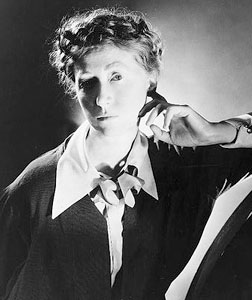Marianne Moore's "Poetry"
Why did she keep revising it?
I've never been completely sure what I think about Marianne Moore's celebrated poem "Poetry." Apparently, Moore had similar feelings—revising the poem many times across the span of five decades. (You can find a couple of unpublished revisions here, courtesy of my friend and colleague Bonnie Costello, an eminent Moore scholar.)
One of the most striking moments in the poem is the phrase "imaginary gardens with real toads in them," a formulation Moore sets off with quotation marks even though, as far as I know, no one has ever identified a source. I suspect that Moore invented the image but, finding it a little too pat or studied, tempered and complicated her line by pretending it was a quotation. But who knows? By comparison, the phrase "a literalist of the imagination," Moore's paraphrase of William Butler Yeats' remark about William Blake, is almost—though not really!—simple. Moore likes to keep everything shifting andvibrating. That the reader is never completely sure suits her purpose.
The most famous (and most widely lamented) version of "Poetry" is the one Moore published in her 1967 The Complete Poems of Marianne Moore. Many readers, including numbers of Moore's fellow poets, consider this one of the most egregious examples ever of terrible revision. In that 1967 version, Moore reduced "Poetry" to just three lines:
I, too, dislike it.
***Reading it, however, with a perfect contempt for it, one discovers in
***it, after all, a place for the genuine.
This drastic compression seems designed to frustrate the poem's admirers (perhaps especially the critics and scholars who had commented on the poem), taking back the exquisitely twisty epigrams and images that readers had enjoyed, analyzed, quoted. To tease her admirers and critics—or to complicate their responses even further—Moore had it both ways by including the longer poem as a kind of endnote to the three-liner. She published the full, 1924 version (reprinted below), the one preferred by many of her admirers and later editors, in the back matter of that same 1967 Complete Poems with the laconic heading "Original Version." In various ways, the two incarnations of the poem annotate, challenge, and criticize one another. I think they amusingly challenge and criticize us readers, too.
Such pranks and ambushes allow a lively uncertainty into Moore's art: Her serpentine, sometimes erratic sentences glide across the precise syllable counts of her lines. That contrast seems central to Moore. She likewise relishes another, perhaps related contrast: onthe one hand, exactdetails of animal behavior, like that of bats, elephants, and wolves and, on the other, the enigmas and complexities of animal actions—and of the behavior, too, of baseball fans and literary critics, considered along with the pushing, rolling, hanging upside-down of the animals.
Moore, as I understand her project, champions both clarity and complexity, rejecting the shallow notion that they are opposites. Scorning a middlebrow reduction of everything into easy chunks, she also scorns obfuscation and evasive cop-outs. Tacitly impatient with complacency and bluffing, deriding the flea-bitten critic, unsettling the too-ordinary reader, she sets forth an art that is irritable, attentive, and memorably fluid.
"Poetry"
I, too, dislike it: there are things that are important beyond all this fiddle.
*****Reading it, however, with a perfect contempt for it, one discovers in
*****it, after all, a place for the genuine.
***********Hands that can grasp, eyes
***********that can dilate, hair that can rise
*****************if it must, these things are important not because ahigh-sounding interpretation can be put upon them but because they are
*****useful. When they become so derivative as to become unintelligible
*****the same thing may be said for all of us, that we
***********do not admire what
***********we cannot understand: the bat
*****************holding on upside down or in quest of something toeat, elephants pushing, a wild horse taking a roll, a tireless wolf under
*****a tree, the immovable critic twitching his skin like a horse that feels a flea
*******************************************************the base-
*****ball fan, the statistician—
***********nor is it valid
*****************to discriminate against "business documents andschool-books"; all these phenomena are important. One must make a *******************************************distinction
*****however: when dragged into prominence by half poets, the result is not
*************************************************poetry,
*****nor till the poets among us can be
***********"literalists of
***********the imagination"—above
*****************insolence and triviality and can presentfor inspection, "imaginary gardens with real toads in them," shall we have
*****it. In the meantime, if you demand on the one hand,
*****the raw material of poetry in
***********all its rawness and
***********that which is on the other hand
*****************genuine, you are interested in poetry.********************************************—Marianne Moore
Click the arrow on the audio player below to hear Robert Pinsky read "Poetry." You can also download the recording or subscribe to Slate's Poetry Podcast on iTunes.
Slate Poetry Editor Robert Pinsky will be participating in the Poems "Fray" this week. Post your questions and comments on "Poetry," and he'll respond and participate. (In the interest of keeping the discussion as rich as possible, please read existing commentsbefore posting your own.) You can also browse "Fray" discussions of previous classic poems.
